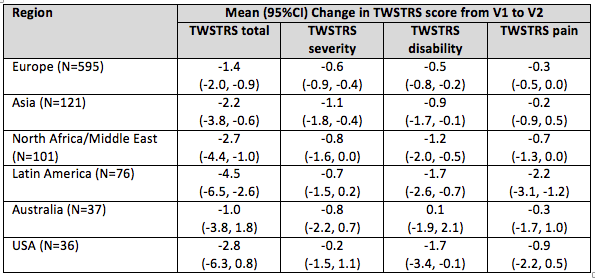Session Information
Date: Thursday, June 8, 2017
Session Title: Dystonia
Session Time: 1:15pm-2:45pm
Location: Exhibit Hall C
Objective: Investigate the drivers for change in Toronto Western Spasmodic Rating Scale (TWSTRS) scores in subjects with cervical dystonia (CD) following a single injection of botulinum neurotoxin type A (BoNT-A).
Background: The TWSTRS is a composite of 3 subscales (severity, disability and pain) that cover different features of CD. The scale is sensitive to change following BoNT-A treatment. However, little is known if there are regional differences that influences the drivers for change following treatment.
Methods: INTEREST IN CD2 (NCT01753349) is an ongoing observational study of subjects with CD undergoing routine BoNT-A treatment; it is being conducted in 34 countries and 6 regions (Europe, Asia, North Africa/Middle East, Latin America, Australia and USA). This analysis of 966 subjects demonstrates a persistent improvement of the total TWSTRS score between baseline/first injection visit (V1) to end of cycle/next injection cycle (V2), and an evaluation by region investigated which subscales were important drivers for change from baseline in TWSTRS total score.
Results: Regional analysis of change in TWSTRS scores from V1 to V2 revealed differences in both TWSTRS total score, and in the subscales that were drivers for change. For example, TWSTRS pain was the key driver of change in total TWSTRS scores in Latin America (49% of TWSTRS total score change), whereas this was much less evident in Asia (9% of change). In the USA, TWSTRS disability was the biggest driver of change (61% of change) and TWSTRS severity was the smallest (7% of change). However, the converse was true for Australia where disability accounted for 10% and TWSTRS severity accounted for 80% of TWSTRS total score change [Table 1].
Conclusions: These data indicate that there are regional differences influencing the drivers for change in TWSTRS total score following BoNT-A treatment. Cultural differences in patient perceptions (e.g. pain) and health expectations may explain these differences.
To cite this abstract in AMA style:
V. Misra, D. Charles, T.M. Chung, C. Colosimo, S. Om, P. Maisonobe. Regional differences may influence the drivers of change in Toronto Western Spasmodic Rating Scale (TWSTRS) scores following botulinum toxin treatment: Analysis of an international observational study [abstract]. Mov Disord. 2017; 32 (suppl 2). https://www.mdsabstracts.org/abstract/regional-differences-may-influence-the-drivers-of-change-in-toronto-western-spasmodic-rating-scale-twstrs-scores-following-botulinum-toxin-treatment-analysis-of-an-international-observational-study/. Accessed February 8, 2026.« Back to 2017 International Congress
MDS Abstracts - https://www.mdsabstracts.org/abstract/regional-differences-may-influence-the-drivers-of-change-in-toronto-western-spasmodic-rating-scale-twstrs-scores-following-botulinum-toxin-treatment-analysis-of-an-international-observational-study/

